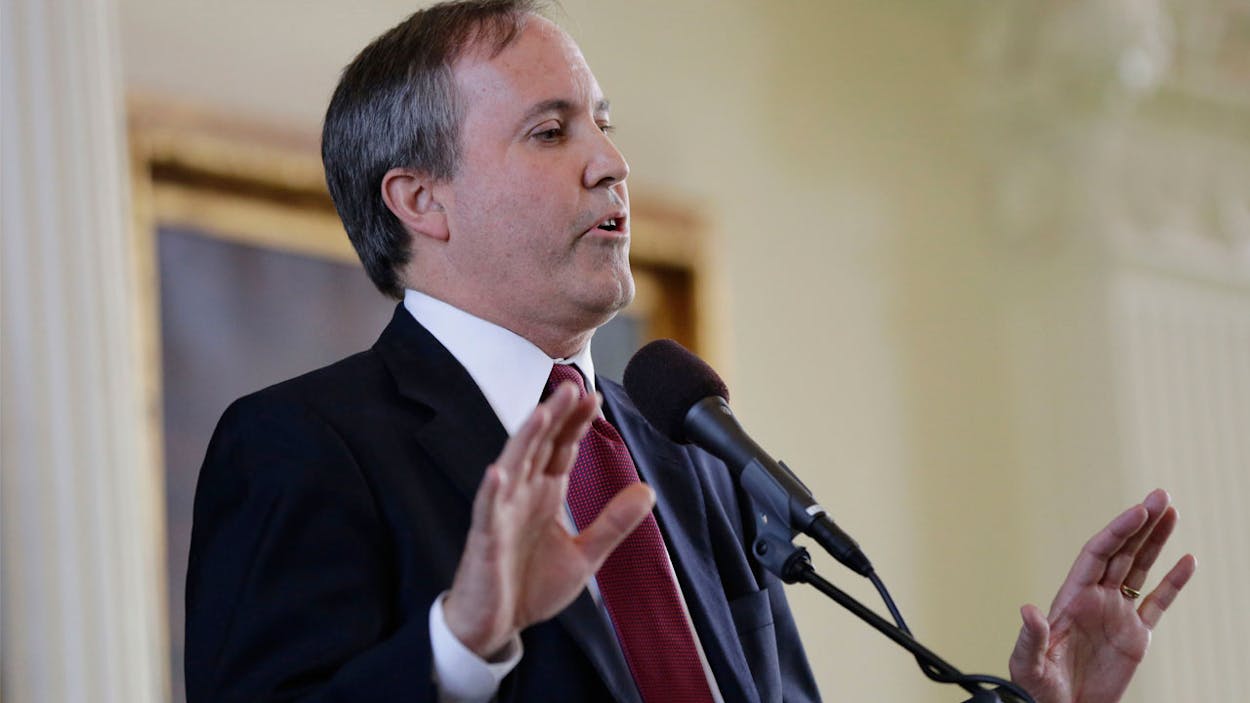WFAA reports that a Collin County grand jury has indicted Ken Paxton on several felony charges. The charges, per WFAA, will be unsealed on Monday, so it’s unclear what he’ll be charged with, but we can make some educated guesses (SEE UPDATE, BELOW):
Special prosecutors in the Paxton case told News 8 they planned to present a third-degree charge of failing to register with the state securities board, as the law requires. They also said they planned to present a first degree felony charge against Paxton accusing him of securities fraud. All indications are that charge is related to Servergy, a McKinney-based company that has been under investigation by the Securities and Exchange Commission.
As WFAA notes, Paxton can continue to serve under indictment, as his predecessor Jim Mattox did back in the 1980s, and as Rick Perry did more recently. Like all indicted people, Paxton should be considered innocent until proven guilty, and the Perry example illustrates why Texas law is so sanguine about indicted officials. Our former governor was indicted on charges of coercion and abuse of power in 2014; the former charge was thrown out by a state appeals court last week, and I would be shocked if a jury finds him guilty of the latter. Paxton, however, is unlikely to be so lucky.
Will the public pay attention, though? The potential third-degree felony charge they mention is, again, the one that Paxton admitted to more than a year ago. Here, again, is what I wrote about it at the time. Here’s what Jay Root wrote about it at the time, May 2014, for the Texas Tribune. Here’s Christy Hoppe, with the Dallas Morning News, on how the McKinney police reacted to the news, more than a year ago. Here’s Joshua Fechter, San Antonio Express-News, writing in May 2014 about a complaint filed with the national Securities and Exchange Commission, days after Paxton was reprimanded by the state Securities Board.
I could go on, but I think the point is clear enough. Paxton admitted to a felony before he was elected attorney general—before he even won the Republican nomination, in fact. This was widely documented in the Texas press at the time. That didn’t stop Paxton from winning the primary runoff in late May, buoyed by a pseudo-endorsement from Ted Cruz and the Texas conservative grassroots’ unhinged animus against anyone—in this case, state representative Dan Branch—with a known professional or personal association with Joe Straus.
In other words, our attorney general isn’t the political equivalent of a lemon. It was a matter of public record, during his campaign for statewide office, that Paxton could easily face felony charges while serving as Texas’s top law enforcement official, or—best case scenario, if you believe his spokesman, Anthony Holm—that Paxton’s election would leave Texas with an attorney general who commits the occasional felony by accident, and gets away with nothing more than a formal reprimand from the state Securities Board because no one bothers to follow up with the prosecutors.
The good news is that, as far as anyone knows, Paxton’s travails are Paxton’s alone; the charges relate to his private legal practice. Texas still has a competent attorney general’s office, with plenty of talent in critical roles, including Scott Keller as solicitor general; Bernard McNamee as chief of staff; Chip Roy as first assistant attorney general; and David Maxwell as director of law enforcement, among others, not to mention countless attorneys and other professionals who work for the office, rather than whoever happens to be the attorney general at the time. The bad news? We get the elected officials we deserve. I’d like to think Texas deserves better. In 2014, a majority of voters decided we did not.
UPDATE: Manny Fernandez, at the New York Times, reports that Paxton will face three charges: one for the aforementioned failure to register as an investment advisor representative, which is a third-degree felony, and two for securities fraud, a first-degree felony.







